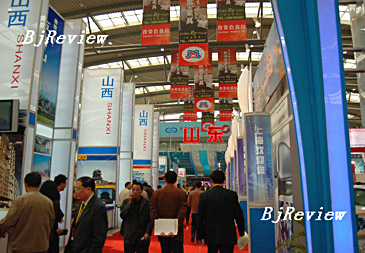
"This is our first time participating in this expo, and we just want to promote and spread our brand a bit further here to the vast west of China," said Cao Fulin, a sales manager for Hsufuchifoods Ltd., a well-known food company based in Dongguan, south China's Guangdong Province. He was speaking at the 11th Investment and Trade Forum for Cooperation Between East and West China which kicked off in early April in Xi'an, capital of northwest China's Shaanxi Province.
The five-day annual event, which serves as a platform and propeller for the economic development of west China, which is comparatively underdeveloped, resulted in a total of 1,285 contracts signed and an investment of 193.3 billion yuan, according to the organizers.
"It is like a bridge linking the east and west and is deepening the opening up reform in the western region. The event acts as an important platform for the regional economy and to promote common prosperity," said an editorial in the local newspaper Shaanxi Daily.
Besides domestic contracts and investment, the event has also attracted the attention of a growing number of foreign investors. Just 600 foreign investors attended the first event in 1997. This year that number had jumped to 4,000.
"We will see a more internationalized investment and trade forum this year," said Shaanxi Governor Yuan Chunqing at a news conference for the event prior to its opening.
Given the importance of sustainable development officials have been calling for more "green" investment and urging local governments not to sacrifice the environment on the altar of economic growth.
"Governments in northern Shaanxi should carefully assess the environmental impact of investment, especially energy exploration projects, and should not give a green light to those that threaten the environment," said Yuan.
Organizers said a key feature of this year's event was the emphasis on environmentally-friendly investment projects. Three quarters of the projects were in the areas of electronics information, biomedical science and agricultural product processing.
According to Yuan, the underdeveloped western regions were on the lookout for industries seeking to transfer pollution from the east.
"We have signed 157 contracts at this year's forum, but not one of them is a high energy-consuming or heavily-polluting venture," said Yan Ximin, Director of the Xianyang City Investment Bureau in Shaanxi Province.
Yan said Xianyang had signed contracts on exploring the city's geothermal resources and developing tourism, an example of "green investment."
"We prefer agricultural product processing, tourism and hi-tech industries. Coal-burning and water-wasting industries will not get a look-in," Yan said.
Shaanxi is not the only western province that closely scrutinizes the environmental impact of investment. In Beibei District of southwest China's Chongqing Municipality, the government has turned down polluting projects worth of 6 billion yuan since 2003.
For declining those projects, the district, which is on the side of a major tributary of the Yangtze River, was honored as the model of livable places in China by the Central Government last year.
Foreign capital has also spotted business opportunities through the western regions' "green investment" initiative. Nearly 120 contracts were signed at the forum with a total investment of $2.66 billion.
China's western regions are a critical component of the country's energy structure. The region has 65 percent of the nation's mineral deposits and 76 percent of its water resources. The area bordering Shaanxi, Shanxi and Inner Mongolia has about 60 percent of China's verified coal reserves.
However, western regions are prone to natural disasters such as drought and sand storms. In some areas, where energy exploration projects have multiplied in recent years, the ecosystem has deteriorated.
"We need to step up our protection and construction of a favorable ecological environment in the west," said Cao Yushu, Deputy Director of the Office of the Leading Group for Western Region Development under the State Council recently, when addressing the problems facing China's ambitious campaign for development of the west.
China has invested 110 billion yuan in protecting the environment in the western region since 2000 and has set a target of reducing energy consumption per unit of GDP by 20 percent between 2006 and 2010.
China has also pledged to reduce emission of sulfur dioxide by 8.4 million tons and of carbon dioxide by 360 million tons during the five-year period.
To achieve the target, the country needs to optimize its economic structure and focus more on recycling and growing the service sector and hi-tech industries, according to China's 11th Five-Year Plan for Energy Development (2006-10) released by the National Development and Reform Commission. | 